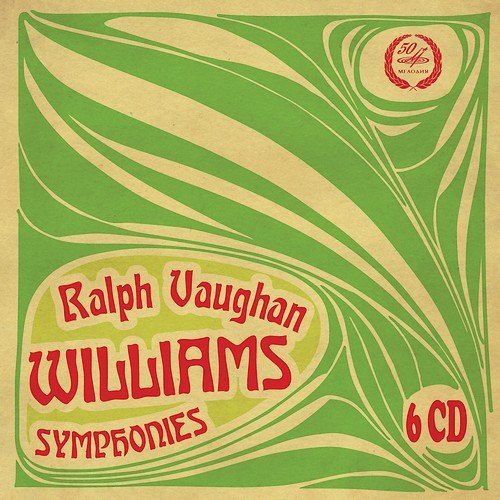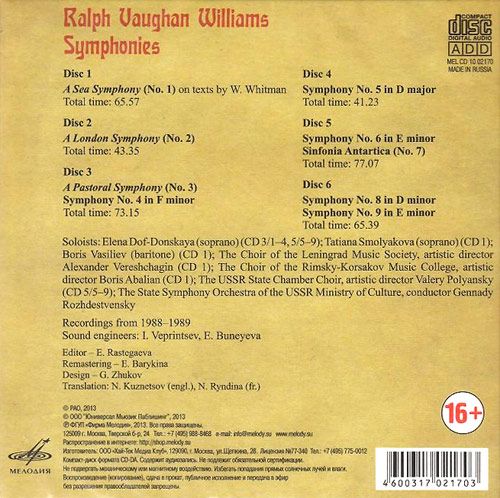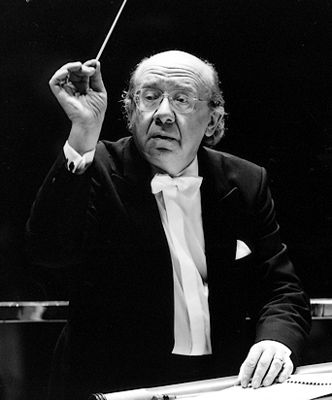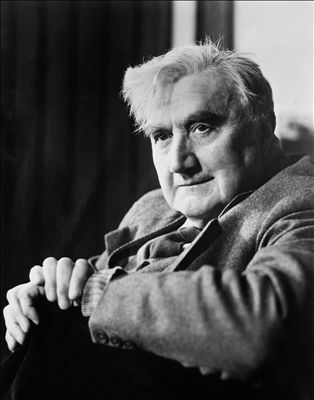wimpel69
12-22-2014, 04:00 PM
The sharing period has ended. No more requests, and no re-ups please.
"Rozhdestvensky (still going strong at 83) reinvents the music of Vaughan Williams as a
universal language, neither English nor 20th century, accessible to all people at all times."
Norman Lebrecht
Ralph Vaughan Williams (1872-1958) left a varied oeuvre that includes orchestral
works, songs, operas, and various choral compositions. While primarily drawing on the rich
tradition of English folksong and hymnody, Vaughan Williams produced well-loved works
that fit into larger European traditions and gained worldwide popularity.
Vaughan Williams, who lost his father early in life, was cared for by his mother. Related,
through his mother, to both Charles Darwin and the Wedgwoods of pottery fame, he grew
up without financial worries. He studied history and music at Trinity College, Cambridge, and
finished up at the Royal College of Music, where he worked with Parry, Wood, and Stanford.
In 1897, the year he married Adeline Fisher, Vaughan Williams traveled to Berlin to study
with Max Bruch, also seeking Maurice Ravel as a teacher several years later, despite the
fact that the French composer was three years his junior. In 1903, he started collecting
English folksongs; certain characteristics of English folk music, particularly its modal
tonalities, in many ways informed his approach to composition. Vaughan Williams further
developed his style while working as editor of the English Hymnal, which was completed in
1906. His work on the English Hymnal went beyond editing, for he contributed several new
hymn tunes, most notably the Sine nomine, the tune for the hymn For All the Saints.
The composer's interest in and knowledge of traditional English music is reflected in his
song cycle On Wenlock Edge (1909), based on selections from A.E. Housman's
immensely popular volume of poetry A Shropshire Lad. In his Fantasia on a Theme of
Thomas Tallis, composed in 1910, Vaughan Williams introduced antiphonal effects
within the context of modal tonality, juxtaposing consonant, but unrelated, triads. Composed
in 1914, his Symphony No. 2, "A London Symphony" brings to life, with great charm,
the sounds of London from dawn to dusk. That year, Vaughan Williams also wrote his pastoral
The Lark Ascending, for violin and orchestra. When World War I broke out, the 41-year-
old composer enlisted as an orderly in the medical corps, becoming famous for organizing
choral singing and other entertainment in the trenches. He was commissioned from the ranks,
ending his war service as an artillery officer. The war interrupted the composer's work but
did not, it seems, disrupt the inner continuity of his creative development. The Symphony
No. 3 ("Pastoral"), composed in 1922, conjures up a familiar world, effectively incorporating
folksong motives into sonorities created by sequential chords. While critics detected pessimistic
moods and themes in the later symphonies, ascribing a shift to a darker vision to the
composer's alleged general pessimism about the world, Vaughan Williams refused to attach
any programmatic content to these works. However, the composer created a convincing
musical description of a desolate world in his Symphony No. 7 "Sinfonia Antarctica" (1952),
which was inspired by the music he wrote for the Ealing film Scott of the Antarctic.
In addition to his symphonies, Vaughan Williams composed highly acclaimed religious music, as
well as works inspired by English spiritual literature, culminating in his 1951 opera The Pilgrim's
Progress, based on the spiritual classic by John Bunyan. An artist of extraordinary creative
energy, Vaughan Williams continued composing with undiminished powers until his death at 87
Melodiya presents a complete set of Ralph Vaughan Williams’s symphonies
conducted by Gennady Rozhdestvensky. These recordings, performed by the
prominent Russian conductor and recognized master of interpretation of
20th century music were made at concerts in 1988–1989 in Leningrad.

Music Composed by
Ralph Vaughan Williams
Played by the
USSR Ministry of Culture Symphony Orchestra
With
Elena Dof-Donskaya (soprano)
Tatiana Smolyakova (soprano)
Boris Vasiliev (baritone)
And
The Choir of the Leningrad Music Society
The Choir of the Rimsky-Korsakov Music College
The USSR State Chamber Choir
Conducted by
Gennady Rozhdestvensky

"It’s a lamentable fact that the Vaughan Williams symphonies have only been performed
once in Britain as a complete cycle (by Richard Hickox and the Bournemouth Symphony
Orchestra in the mid-1990s). Who knew that, in Leningrad a few years earlier, all nine works
were given in a series of concerts by Gennady Rozhdestvensky and the horribly named
State Symphony Orchestra of the USSR Ministry of Culture?
Horribly named, but composed of the best players and led by a conductor whose stint
with the BBC Symphony Orchestra turned him into an admirer of all things English –
especially moderation. The 1988–89 cycle has just appeared on record and I could
hardly wait to hear what Russians make of our island symphonist.
The first two RVW symphonies can seem inconclusive, and Rozhdestvensky comes up
with no clear reading of their enigmas. It is in the Pastoral Symphony that he achieves
penetration, underplaying intended French accents for an earthier Russian gruel –
more Prokofiev than Ravel, and much the stronger for it.
The Fourth Symphony sheds the shadow of Sibelius for an air of foreboding, a deep
pessimism that pulls on a polite, cold smile. The Fifth Symphony, contemporary with
Shostakovich’s Seventh, shares its wartime mission of raising morale while conveying
grim realities. The Russians play RVW’s Sixth as if it were pure Shostakovich –
cin�ma-v�rit�, coded with unutterable secrets. The Ninth Symphony becomes a Mahlerian
dialogue with eternity.
Intriguing, illuminating, vitally uplifting, marred only slightly by the asperities of Russian
sound recording, these recordings show what a difference a great conductor can make.
Rozhdestvensky (still going strong at 83) reinvents the music of Vaughan Williams as a
universal language, neither English nor 20th century, accessible to all people at all times.
After Barbirolli, this set becomes my first choice."
Norman Lebrecht


The sharing period has ended. No more requests, and no re-ups please.
"Rozhdestvensky (still going strong at 83) reinvents the music of Vaughan Williams as a
universal language, neither English nor 20th century, accessible to all people at all times."
Norman Lebrecht
Ralph Vaughan Williams (1872-1958) left a varied oeuvre that includes orchestral
works, songs, operas, and various choral compositions. While primarily drawing on the rich
tradition of English folksong and hymnody, Vaughan Williams produced well-loved works
that fit into larger European traditions and gained worldwide popularity.
Vaughan Williams, who lost his father early in life, was cared for by his mother. Related,
through his mother, to both Charles Darwin and the Wedgwoods of pottery fame, he grew
up without financial worries. He studied history and music at Trinity College, Cambridge, and
finished up at the Royal College of Music, where he worked with Parry, Wood, and Stanford.
In 1897, the year he married Adeline Fisher, Vaughan Williams traveled to Berlin to study
with Max Bruch, also seeking Maurice Ravel as a teacher several years later, despite the
fact that the French composer was three years his junior. In 1903, he started collecting
English folksongs; certain characteristics of English folk music, particularly its modal
tonalities, in many ways informed his approach to composition. Vaughan Williams further
developed his style while working as editor of the English Hymnal, which was completed in
1906. His work on the English Hymnal went beyond editing, for he contributed several new
hymn tunes, most notably the Sine nomine, the tune for the hymn For All the Saints.
The composer's interest in and knowledge of traditional English music is reflected in his
song cycle On Wenlock Edge (1909), based on selections from A.E. Housman's
immensely popular volume of poetry A Shropshire Lad. In his Fantasia on a Theme of
Thomas Tallis, composed in 1910, Vaughan Williams introduced antiphonal effects
within the context of modal tonality, juxtaposing consonant, but unrelated, triads. Composed
in 1914, his Symphony No. 2, "A London Symphony" brings to life, with great charm,
the sounds of London from dawn to dusk. That year, Vaughan Williams also wrote his pastoral
The Lark Ascending, for violin and orchestra. When World War I broke out, the 41-year-
old composer enlisted as an orderly in the medical corps, becoming famous for organizing
choral singing and other entertainment in the trenches. He was commissioned from the ranks,
ending his war service as an artillery officer. The war interrupted the composer's work but
did not, it seems, disrupt the inner continuity of his creative development. The Symphony
No. 3 ("Pastoral"), composed in 1922, conjures up a familiar world, effectively incorporating
folksong motives into sonorities created by sequential chords. While critics detected pessimistic
moods and themes in the later symphonies, ascribing a shift to a darker vision to the
composer's alleged general pessimism about the world, Vaughan Williams refused to attach
any programmatic content to these works. However, the composer created a convincing
musical description of a desolate world in his Symphony No. 7 "Sinfonia Antarctica" (1952),
which was inspired by the music he wrote for the Ealing film Scott of the Antarctic.
In addition to his symphonies, Vaughan Williams composed highly acclaimed religious music, as
well as works inspired by English spiritual literature, culminating in his 1951 opera The Pilgrim's
Progress, based on the spiritual classic by John Bunyan. An artist of extraordinary creative
energy, Vaughan Williams continued composing with undiminished powers until his death at 87
Melodiya presents a complete set of Ralph Vaughan Williams’s symphonies
conducted by Gennady Rozhdestvensky. These recordings, performed by the
prominent Russian conductor and recognized master of interpretation of
20th century music were made at concerts in 1988–1989 in Leningrad.

Music Composed by
Ralph Vaughan Williams
Played by the
USSR Ministry of Culture Symphony Orchestra
With
Elena Dof-Donskaya (soprano)
Tatiana Smolyakova (soprano)
Boris Vasiliev (baritone)
And
The Choir of the Leningrad Music Society
The Choir of the Rimsky-Korsakov Music College
The USSR State Chamber Choir
Conducted by
Gennady Rozhdestvensky

"It’s a lamentable fact that the Vaughan Williams symphonies have only been performed
once in Britain as a complete cycle (by Richard Hickox and the Bournemouth Symphony
Orchestra in the mid-1990s). Who knew that, in Leningrad a few years earlier, all nine works
were given in a series of concerts by Gennady Rozhdestvensky and the horribly named
State Symphony Orchestra of the USSR Ministry of Culture?
Horribly named, but composed of the best players and led by a conductor whose stint
with the BBC Symphony Orchestra turned him into an admirer of all things English –
especially moderation. The 1988–89 cycle has just appeared on record and I could
hardly wait to hear what Russians make of our island symphonist.
The first two RVW symphonies can seem inconclusive, and Rozhdestvensky comes up
with no clear reading of their enigmas. It is in the Pastoral Symphony that he achieves
penetration, underplaying intended French accents for an earthier Russian gruel –
more Prokofiev than Ravel, and much the stronger for it.
The Fourth Symphony sheds the shadow of Sibelius for an air of foreboding, a deep
pessimism that pulls on a polite, cold smile. The Fifth Symphony, contemporary with
Shostakovich’s Seventh, shares its wartime mission of raising morale while conveying
grim realities. The Russians play RVW’s Sixth as if it were pure Shostakovich –
cin�ma-v�rit�, coded with unutterable secrets. The Ninth Symphony becomes a Mahlerian
dialogue with eternity.
Intriguing, illuminating, vitally uplifting, marred only slightly by the asperities of Russian
sound recording, these recordings show what a difference a great conductor can make.
Rozhdestvensky (still going strong at 83) reinvents the music of Vaughan Williams as a
universal language, neither English nor 20th century, accessible to all people at all times.
After Barbirolli, this set becomes my first choice."
Norman Lebrecht


The sharing period has ended. No more requests, and no re-ups please.